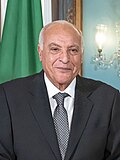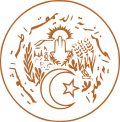 |
|---|
|
The minister of foreign affairs of the People's Democratic Republic of Algeria is a cabinet minister in charge of the Ministry of Foreign Affairs of Algeria, responsible for conducting foreign relations of the country.
The following is a list of foreign ministers of Algeria since the establishment of the GPRA in 1958: [1]
| No. | Name (Birth–Death) | Portrait | Tenure |
|---|---|---|---|
| 1 | Mohamed Lamine Debaghine (1917–2003) In exile |  | 1958–1960 |
| 2 | Krim Belkacem (1922–1970) In exile |  | 1960–1961 |
| 3 | Saad Dahlab (1918–2000) In exile |  | 1961–1962 |
| 4 | Mohamed Khemisti (1930–1963) |  | 1962–1963 |
| 5 | Abdelaziz Bouteflika (1937–2021) |  | 1963–1979 |
| 6 | Mohammed Seddik Benyahia (1932–1982) |  | 1979–1982 |
| 7 | Ahmed Taleb Ibrahimi (1932–2025) |  | 1982–1988 |
| 8 | Boualem Bessaïh (1930–2016) |  | 1988–1989 |
| 9 | Sid Ahmed Ghozali (1937–2025) | 1989–1991 | |
| 10 | Lakhdar Brahimi (b. 1934) |  | 1991–1993 |
| 11 | Redha Malek (1931–2017) |  | 1993 |
| 12 | Mohamed Salah Dembri (1938–2020) |  | 1993–1996 |
| 13 | Ahmed Attaf (b. 1953) |  | 1996–1999 |
| 14 | Youcef Yousfi (b. 1941) |  | 1999–2000 |
| 15 | Abdelaziz Belkhadem (b. 1945) |  | 2000–2005 |
| 16 | Mohammed Bedjaoui (b. 1929) |  | 2005–2007 |
| 17 | Mourad Medelci (1943–2019) |  | 2007–2013 |
| 18 | Ramtane Lamamra (b. 1952) |  | 2013–2017 |
| 19 | Abdelkader Messahel (b. 1949) |  | 2017–2019 |
| (18) | Ramtane Lamamra (b. 1952) |  | 2019 |
| 20 | Sabri Boukadoum (b. 1958) |  | 2019 |
| 2020–2021 | |||
| (18) | Ramtane Lamamra (b. 1952) |  | 2021–2023 |
| (13) | Ahmed Attaf (b. 1953) |  | 2023–present |
